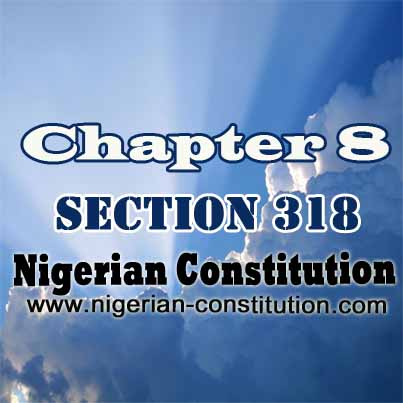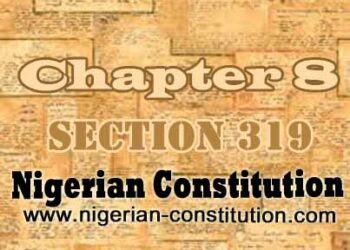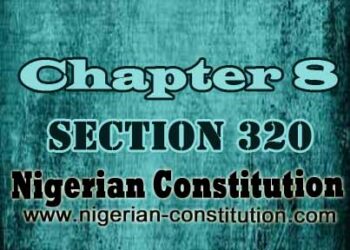(1) In this constitution, unless it is otherwise expressly provided or the context otherwise requires-
“Act” or “Act of the National Assembly” means any law made by the National Assembly and includes any law which takes effect under the provisions of this constitution as an Act of the National Assembly;
“appointment” or its cognate expression includes appointment on promotion and transfer or confirmation of appointment;
“area council” means each of the administrative areas within the Federal Capital Territory, Abuja;
“authority” includes government; “belong to” or its grammatical expression when used with reference to a person in a state refers to a person either or whose parents or any of whose grand parents was a member of a community indigenous to that state;
“civil service of the Federation” means service of the Federation in a civil capacity as staff of the office of the President, the Vice-President, a ministry or department of the government of the Federation assigned with the responsibility for any business of the Government of the Federation;
“civil service of the state” means service of the government of a state in a civil capacity as staff of the office of the governor, deputy governor or a ministry or department of the government of the state assigned with the responsibility for any business of the government of the state;
“Cod of Conduct” refers to the Code of Conduct contained in the fifth schedule to this constitution;
“Commissioner” means a Commissioner of the Government of a State;
“Concurrent Legislative List” means the list of matters set out in the first column in Part 11 of the second schedule to this constitution with respect to which the National Assembly and a House of Assembly may make laws to the extent prescribed, respectively, opposite thereto in the second column thereof;
“decision” means, in relation to a court, any determination of that court and includes judgement decree, order, conviction, sentence or recommendation;
“enactment” means provision of any law or a subsidiary instrument;
“Exclusive Legislative List” means the list in Part 1 of the second schedule to this constitution;
“existing law” has the meaning assigned to it in section 315 of this constitution;
“federal character of Nigeria” refers to the distinctive desire of the peoples of Nigeria to promote national unity, foster national loyalty and give every citizen of Nigeria a sense of belonging to the nation as expressed in section 14 (3) and (4) of this constitution;
“Federation” means the Federal Republic of Nigeria;
“financial year” means any period of twelve months beginning on the first day of January in any year or such other date as the National Assembly may prescribe;
“function” includes power and duty;
“government” includes the Government of the Federation, or of any state, or of a local government council or any person who exercises power of authority on its behalf;
“Governor” or “Deputy Governor” means the governor of a state or a deputy governor of a state; “House of Assembly” means the House of Assembly of a state;
“Financial year” means any period of twelve months beginning on the first day of January in any year or such other date as the National Assembly may prescribe;
“function” includes power and duty;
“government” includes the Government of the Federation, or any State, or of a local government council or any person who exercises power or authority on its behalf;
“Governor” or Deputy Governor” means the Governor of a State or a Deputy Governor of a State;
“House of Assembly” means the House of Assembly of a State;
“Judicial office” means the office of Chief Justice of Nigeria or a Justice of the Supreme Court, the President or Justice of the Court of Appeal, the office of the Chief Judge or a Judge of the Federal High Court, the office of the Chief Judge or Judge of the High Court of the Federal Capital Territory, Abuja, the office of the Chief Judge of a State and Judge of the High Court of a State, a Grand Kadi or Kadi of the Sharia Court of Appeal of the Federal Capital Territory, Abuja, a President or Judge of the Customary Court of Appeal; of the Federal Capital Territory, Abuja, a Grand Kadi or Kadi of the Sharia Court of Appeal of a State; and a reference to a “judicial officer” is a reference to the holder of any such office;
“law” means a law enacted by the House of Assembly of a State;
“Legislative house” means the Senate, House of Representatives or a House of Assembly.
“Local government area” or “local government council” includes an area council;
“public service of a State’ means the service of the State in any capacity in respect of the Government of the State and includes service as:
(a) Clerk or other staff of the House of Assembly;
(b) member of staff of the High Court, the Sharia court of Appeal, the Customary Court of Appeal; or other courts established for a State by this Constitution or by a Law of a House of Assembly;
(c) member or staff of any commission or authority established for the State by this Constitution or by a Law of a House of Assembly;
(d) staff of any local government council;
(e) staff of any statutory corporation established by a Law of a House of Assembly;
(f) staff of any educational institution established or financed principally by a government of a State; and
(g) staff of any company or enterprise in which the government of a State or its agency holds controlling shares or interest; “School Certificate or its equivalent” means
(a) a Secondary School Certificate or its equivalent, or Grade II Teacher’s Certificate, the City and Guilds Certificate; or
(b) education up to Secondary School Certificate level; or
(c) Primary Six School Leaving Certificate or its equivalent and –
(i) service in the public or private sector in the Federation in any capacity acceptable to the Independent National Electoral Commission for a minimum of ten years, and
(ii) attendance at courses and training in such institutions as may be acceptable to the Independent National Electoral Commission for periods totalling up to a minimum of one year, and
(iii) the ability to read, write, understand and communicate in the English language to the satisfaction of the Independent National Electoral Commission, and
(d) any other qualification acceptable by the Independent National Electoral Commission; “Secret society” includes any society, association, group or body of persons (whether registered or not)
(a) that uses secret signs, oaths, rites or symbols and which is formed to promote a cause, the purpose or part of the purpose of which is to foster the interest of its members and to aid one another under any circumstances without due regard to merit, fair play or justice to the detriment of the legitimate interest of those who are not members;
(b) the membership of which is incompatible with the function or dignity of any public office under this Constitution and whose members are sworn to observe oaths of secrecy; or
(c) the activities of which are not known to the public at large, the names of whose members are kept secret and whose meetings and other activities are held in secret; “State” when used otherwise than in relation to one of the component parts of the Federation, includes government.
(2) Wherever it is provided that any authority or person has power to make, recommend or approve an appointment to an office, such power shall be construed as including the power to make, recommend or approve a person for such appointment, whether on promotion or otherwise, or to act in any such office.
(3) In this Constitution, references to a person holding an office shall include reference to a person acting in such office.
(4) The Interpretation Act shall apply for the purpose of interpreting the provision of this Constitution.

















